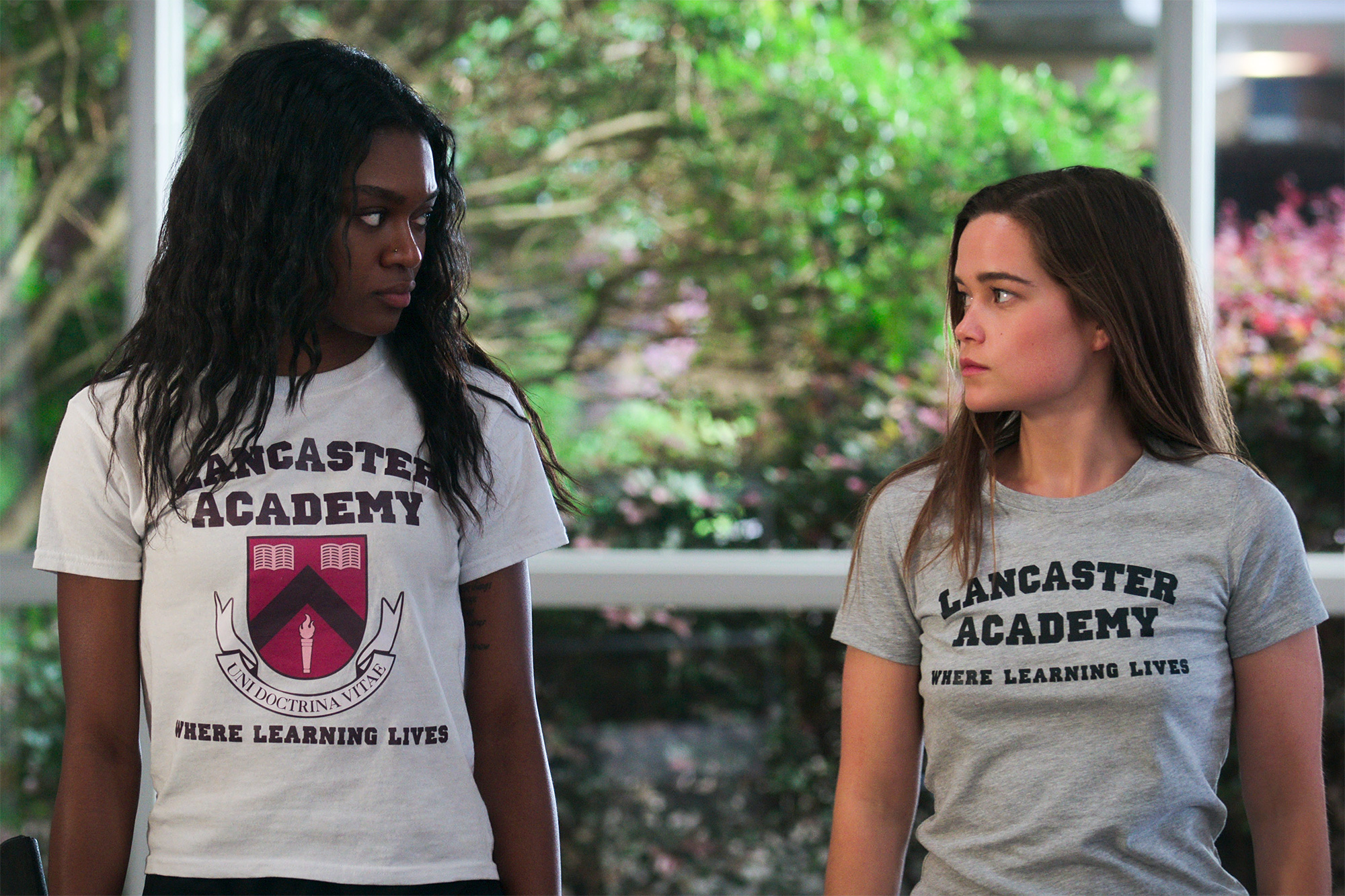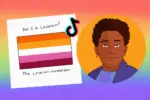Every little girl dreams of her “firsts” — her first crush, her first love, and her first … kill?
Introducing “First Kill,” the latest Netflix series that brings back vampires in a new way. With young vampire Juliette “Jules” Fairmont (Sarah Catherine Hook) falling for monster hunter Calliope “Cal” Burns (Imani Lewis), this retelling of Romeo and Juliet takes a sapphic twist that has kept the series in the Netflix Top 10 since its release on June 10. Love blooms quickly between the girls in this Savannah-themed Verona, but when they realize their family legacies should make them mortal enemies instead, all that pining turns into something else.
Producer V.E. Schwab, the author of the short story from “Vampires Never Get Old: Tales with Fresh Bite” that provided the source material, shared her inspiration for the series in an interview with Netflix’s Tudum: “I wanted to write a show where it wasn’t [just] about the queerness. I feel like we’ve come really far in queer storytelling…But 99% of the time, the narrative is about their queerness.” She went on to say, “What it tells queer viewers, especially young queer viewers, is you don’t get to be the main character, unless it’s about your queerness.”
Jules and Cal are main characters, and they are queer, but they are not the main characters because they are queer. Instead, their story focuses on the dynamics of their warring families: Beyond just dealing with the hardships of high school, the girls belong to families with centuries worth of legacies to live up to, including the tradition of making their “first kill.” For Jules, this means murdering an innocent human and becoming a full Legacy vampire. For Cal, this means slaughtering a monster and joining her brothers on the mission to rid all evil from the Earth. As you might expect, homicide isn’t a great way to start a relationship, but even feuds born at the beginning of time can’t stop Jules and Cal from falling in love.
However, not everybody is head over heels for this romance. Open nearly any social media app and you’ll find discourse about whether this vampire drama hits the mark. To get an understanding of both sides of the argument, let’s take a look at a few of these mixed reviews:
“[‘First Kill’ is] for the teen gays who don’t have to be on edge while watching girls kiss on the TV in the family room because they are fully out and no one cares.” – Shelli Nicole, Autostraddle
Like creator Schwab said, “First Kill” is not a show about queerness, just one with queer characters. Jules and Cal are confident in their sexualities throughout the show, even when their relationship is questioned.
The central conflict of Jules and Cal’s relationship is independent from their queerness. When Cal tells her mother that she kissed Jules, her mother is furious not because Jules is a girl, but because she is a vampire. Even in Jules’ situation where the fate of an entire matriarchy depends on her producing daughters, no one seems concerned that Jules likes girls instead of boys. Both Jules’ and Cal’s families forbid the relationship because of the feud between monsters and monster hunters; falling for another girl isn’t even a topic of conversation.
When the girls do talk about sharing their identities with their families for the first time, it’s presented as a positive experience. In Episode 5, “First Love,” Jules says her favorite memory is a conversation with her older sister: “She opened up to me about everything, which she’d never done. We talked all night, and I opened up too, about liking girls. First time I said it out loud.” The moral of the story isn’t Jules “coming out” to her sister but rather growing close to her. And with Cal’s follow-up comment, “I think I was queer from the womb,” it’s obvious she experienced the same in her own family.
To many queer viewers, this is a breath of fresh air. Even popular LGBTQ+ shows like “Heartstopper” or “Ginny & Georgia” that are generally regarded as good representation rely heavily on coming-out stories to drive the plot forward. Though there is merit to such themes, and they certainly have their place in the media, queer audiences deserve more than the same recycled conflicts in every movie and TV show. “First Kill” breaks the standard of teenage LGBTQ+ television with its refreshing plot that involves queerness without focusing on it.
“Leads Sarah Catherine Hook (Juliette) and Imani Lewis (Cal) never bring enough heat to explain why their characters would risk it all. The script does its leads few favors, but even during wordless snogging sessions, the chemistry feels lacking.” – Laura Bradley, the Daily Beast
“First Kill” has received a lot of criticism for its “bad romance” from both critics and viewers alike, and it’s not unfounded. The show certainly establishes that Jules and Cal like one another, but there isn’t a whole lot of explanation for why they do.
The opening episode, “First Kiss,” spends the most time developing the girls’ relationship: While trying to suppress her vampirism, Jules develops a painfully sweet crush on the mysterious new girl that results in their meeting at a high school party. A game of spin the bottle, longing stares across the cafeteria and sweet bee-rescues mid-conversation culminate with a hot-and-heavy kiss that leaves a jar of cherries smashed on the floor. But as quickly as it starts, the combination of Jules’ fangs and Cal’s stake brings a quick end to the momentary burst of passion.
Throughout the eight-episode season, audiences are told that Jules and Cal are in love, but they’re never really shown why. And unfortunately, the best explanation they’ll get comes from the source material itself: “First Kill” depends on the well-known tale of Romeo and Juliet to establish the love story between Jules and Cal. Being as obvious as to host a school production of the play during one of the episodes, the show makes no attempt to provide any additional development beyond obvious Shakespeare references and a few well-timed make-out sessions.
“The relationship is dangerous because it’s between a vampire hunter and a vampire, not because it’s a white girl and a Black girl.” – Tim Surette, TV Guide
Not only does no one care that Jules and Cal like girls, but no one cares that they are different races. A Southern-grown peach, Jules is as white as you might expect a traditional vampire to be, while Cal and her family are Black. But even in the middle of Georgia, nobody blinks an eye at the young interracial couple. Race is secondary to the relationship between Jules and Cal, but that is not to say that it is ignored by the series.
“First Kill” showrunner, writer and executive producer Felicia Henderson said in an interview, “I felt very strongly that if Netflix [was] going to bring me on to this [show,] then I [was] going to bring all that I am, as a Black woman, as a member of a big Black family.” From cookouts to sibling rivalry to a powerhouse mom, the Burns family is represented exactly as they are: as a Black family of hunters. Neither trait takes priority over the other, and neither is left behind.
But is that enough?
Interracial couples portrayed in the media are often focused on one thing: whiteness. Not only will the relationship contain a white person, but much of the conversation around it will consist of its impact on whiteness. Microaggressions like white partners asking for “acceptance” from minority partners or using their relationship as a shield against accusations of racism are popular among these so-called romances. Though “First Kill” is not the perfect representation of all interracial couples (its relationship is between a white and non-white character), thanks in part to Henderson’s involvement, the show avoids falling into stereotyped tropes of minorities in the genre and treats its Black characters with equity across all eight episodes.
“Unlike Romeo and Juliet, Calliope and Juliette are alive at the end of Season 1. However, their love story may be just as dead as Shakespeare’s.” – Lara Rosales, Tell-Tale TV
Disclaimer: This section contains spoilers for “First Kill” episode eight.
The season finale, “First Betrayal,” ends with, as you might expect, betrayal. After Jules makes a decision that Cal can’t forgive, the couple breaks up in a dramatic scene on the lawn that is fit for any supernatural soap opera.
While some might attribute the dramatic breakup to a modern-day execution of the Bury Your Gays trope, such criticism misses the true point of the scene: Though “First Kill” ends with a ruined lesbian relationship, Jules and Cal’s breakup is the result of their own conflict, not some fulfilled stereotype.
Like any straight couple, Jules and Cal are bound to fight — anything else would glamorize sapphic relationships. But their breakup is not an intentional decision designed to undermine LGBTQ+ representation; it is a natural reaction to a normal fight. Jules betrayed Cal, and Cal can’t find a way to love her after it. That doesn’t deface their relationship; if anything, it strengthens it.
So, is “First Kill” worth the watch? Absolutely!
Though Rotten Tomatoes only gives “First Kill” a 55% on the Tomatometer, it has an audience score of 90%. Despite flaws like its underdeveloped romance and eventual breakup, viewers have overwhelmingly fallen in love with this show: For the first time in modern supernatural media, queerness, and interracial lesbianism at that, is normalized. So, while “First Kill” may not have gotten everything right, the things that were right certainly killed it.

















